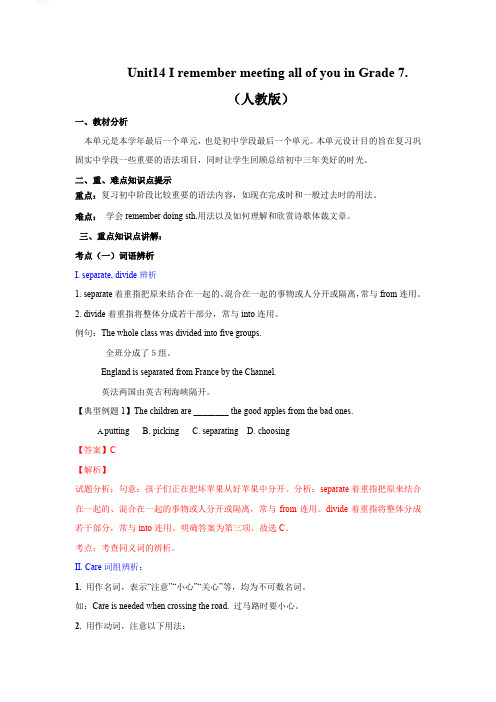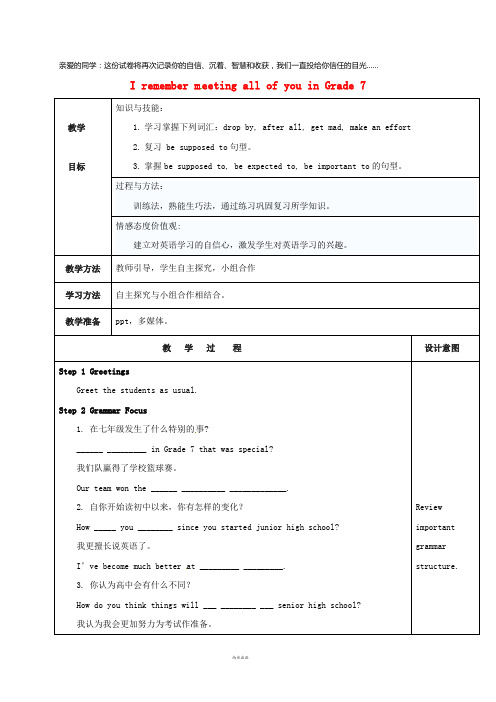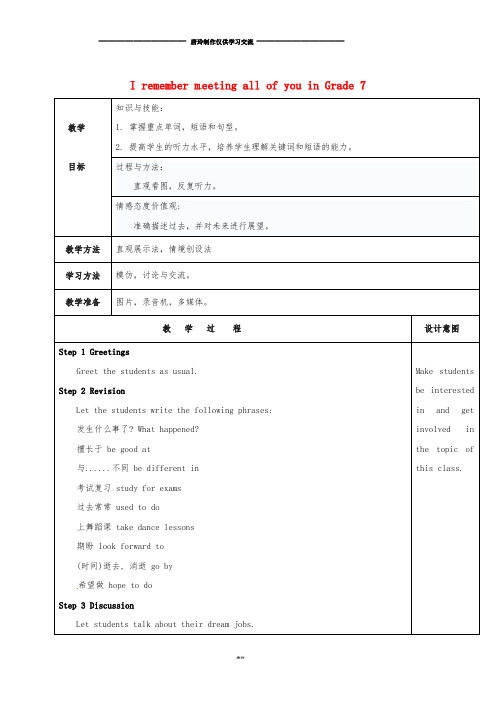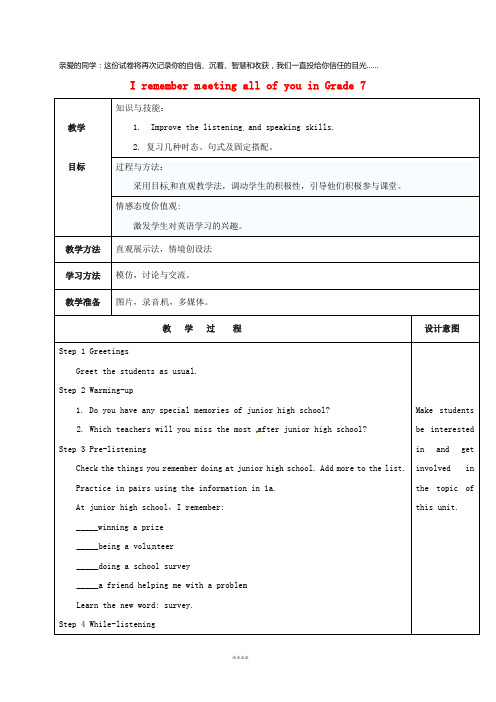人教版初三(上)英语第14讲:UNIT7 语法篇-(教师版)
- 格式:docx
- 大小:188.40 KB
- 文档页数:7

Unit14 I remember meeting all of you in Grade 7.(人教版)一、教材分析本单元是本学年最后一个单元,也是初中学段最后一个单元。
本单元设计目的旨在复习巩固实中学段一些重要的语法项目,同时让学生回顾总结初中三年美好的时光。
二、重、难点知识点提示重点:复习初中阶段比较重要的语法内容,如现在完成时和一般过去时的用法。
难点:学会remember doing sth.用法以及如何理解和欣赏诗歌体裁文章。
三、重点知识点讲解:考点(一)词语辨析I. separate, divide辨析1. separate着重指把原来结合在一起的、混合在一起的事物或人分开或隔离,常与from连用。
2. divide着重指将整体分成若干部分,常与into连用。
例句:The whole class was divided into five groups.全班分成了5组。
England is separated from France by the Channel.英法两国由英吉利海峡隔开。
【典型例题1】The children are ________ the good apples from the bad ones.A.puttingB. pickingC. separatingD. choosing【答案】C【解析】试题分析:句意:孩子们正在把坏苹果从好苹果中分开。
分析:separate着重指把原来结合在一起的、混合在一起的事物或人分开或隔离,常与from连用。
divide着重指将整体分成若干部分,常与into连用。
明确答案为第三项。
故选C。
考点:考查同义词的辨析。
II. Care词组辨析:1.用作名词,表示“注意”“小心”“关心”等,均为不可数名词。
如:Care is needed when crossing the road. 过马路时要小心。
2.用作动词,注意以下用法:(1) 后接不定式,表示“愿意”“喜欢”“想要”,通常用于否定句、疑问句或条件句等。


I remember m eeting all of you in Grade 7教学目标知识与技能:1. 掌握重点单词,短语和句型。
2. 提高学生的听力水平,培养学生理解关键词和短语的能力。
过程与方法:直观看图,反复听力。
情感态度价值观:准确描述过去,并对未来进行展望。
教学方法直观展示法,情境创设法学习方法模仿,讨论与交流。
教学准备图片,录音机,多媒体。
教学过程设计意图Step 1 GreetingsGreet the students as usual.Step 2 RevisionLet the students write the following phrases: 发生什么事了? What happened?擅长于 be good at与......不同 be different in考试复习 study for exams过去常常 used to do上舞蹈课 take dance lessons期盼 look forward to(时间)逝去, 消逝 go by希望做 hope to doStep 3 DiscussionLet students talk about their dream jobs. Make students be interested in and get involved in the topic of this class.Talk with your partner about what you would like to do in the futu re.A: What do you hope to do in the future?B: I hope to get a business degree and become a manager.Step 4 Work on 1aWrite about what you would like to do in the future.1. get a business degree and become a manager2. ____________________________________3. ____________________________________Possible answers: 1. get a business degree and become a manager.2. become an English or Chinese teacher.3. become an astronaut or a doctor.Step 5 Pair workTalk about what you hope to do in the future.A: What do you hope to do in the future?B: I hope to …Step 6 Listening1. 1c. Listen to a class discussion. Check the hopes you hear.1) Write down the job name according to the pictures.2) Play the record and check the answers.2. 1d. Listen again and complete the passage.1) Let students understand the passage and write down some words meaning.Today is the students’ last class. Bob feels ______ about it and thinks Mrs. Chen’s classes have been ______. The students talk about what they want to do in the future. Bob hopes to _____ the exam to get into senior high school. Shirley wants to get into a _______ school.Ken is good at _______ and he won a _____ for it. So he wants to be a(n) _________. Mrs. Chen believes in all of them and tells them to “___________”. To celebrate the end of junior high, they are having a ________. They ask Mrs. Chen to come, and she is happy to accept the invitation. By listening and speaking, students can improve their listening and speaking skills.2) Play the tape. Check some of the answers but without making sure them all.3) Play the tape again. Let students listen carefully and pay attention to notsure part above.Check the answers.Answers: sad, great, pass, music, science, prize, astronaut, go for it, party Step 7 PracticePrepare a speech for your graduation. Use the questions to help you.Present your speech to your group.How have you changed since you started junior high school?Who has helped you most?What advice have your parents given you?What will you do after you graduate?What are you looking forward to?1) Let students answer the questions one by one.2) Ask students to write down a passage according to the information above.3) Let some students read it out.Step 8 HomeworkPractice the conversation in pairs.板书设计Unit 14: I remember meeting all of you in Grade 7. Section B:1a-1e How have you changed since you started junior high school?Who has helped you most?What advice hav e your parents given you?What will you do after you graduate?What are you looking forward to?教后反思。



Unit 7Section A Grammar Focus-4c人教版 英语 九年级上册u To summarize the passive voice with the modal verbs.u To learn to use the grammar properly.u To learn some foreign cultures and learn to make rules.cry all night stay by one’s side sleep in warm arms run through the field make sure keep sb. from danger give sb. a hug lift up talk back 整夜哭待在某人身边睡在温暖的臂弯里穿过田野确定;确保使某人远离危险拥抱某人举起,提起回嘴;顶嘴Translate the phrases.watch scary moviesgive sb. awful dreams be back by tenthink back to those times cough for dayshave scary dreamsbe late for schoolstay outregret doing sth.看恐怖电影带给某人恶梦在10点前回来回想那些时光咳嗽好几天做可怕的梦上学迟到待在外面;不回家后悔做过某事What can you do at school? What can’t you do at school? Do you agree or disagree?Look at these sentences.I think students should be allowed to do homework with friends.Sixteen-year-olds should not be allowed to drive. Do you think sixteen-year-olds should be allowed to choose their own clothes?含有情态动词的被动语态肯定句:主语+ 情态动词+be+ 动词过去分词.否定句:主语+情态动词+not+ be+动词过去分词.疑问句:情态动词+ 主语+ be+ 动词过去分词?转变方法(一)将主动语态的宾语变成被动语态的主语。
Unit7 SectionA(Grammar Focus-4c)教案【教材版本与册数】新目标人教版九年级上册【单元名称】Unit7 Teenagers should be allowed to choose their own clothes?【课时】Section A Grammar Focus-4c(第3课时)【课型】Grammar(语法课)【本课时教学设计】教材分析【本单元话题】谈论规则【本单元重点掌握目标】含有情态动词的被动语态。
【教材内容拆分分析】语法部分重点含有情态动词的被动语态。
4a改写句子,4b用动词的适当形式填空,注意主动语态和被动语态。
同时文章谈论了学生感兴趣的话题成年之后要不要搬出去。
【通过本单元的学习学生需掌握哪些综合技能】通过本单元的学习使学生学会谈论各种规则,熟练含有情态动词的被动语态。
教学目标语言知识目标:1.熟练使用以下词汇、短语和句型:单词:community, chance, educate, manage, society短语:keep away from, make one’s own decision,1 / 10第 1 页句型:I don’t think sixteen-year-olds should be allowed to drive.Do you think we may be allowed to take photos if we don’t use a fl ash?2.含有情态动词的被动语态。
3.学会合作探究学习,学习解决难题情感态度价值观目标:通过教师的引导,学生在学习中的讨论、总结,了解英语学习的方法,熟练运用含有情态动词的被动语态。
教学重难点教学重点:1.掌握所有重点单词,短语和句型。
2.熟练运用含有情态动词的被动语态。
教学难点:运用含有情态动词的被动语态。
建议教法1.小组协作式任务教学法2.感知语法3.语篇教学法4.归纳和演绎教学法5.操练教学流程(详见相应教学设计)教学 1.本课时的目标设计清晰可操作,活动的设计紧扣目标要求并与目标达成一致。
UNIT7 语法篇____________________________________________________________________________________________________________________________________________________________________熟练掌握本模块的语法知识。
含有情态动词的被动语态(should, may, might, can, could, must)一、基本句型结构:1、肯定句:主语+情态动词+be+过去分词....(+by...)e.g.: Teenagers should be allowed to go shopping.Tables can be made of stones.The work must be finished today.The flowers may be planted in February.2、否定句:主语+情态动词+not +be+ 过去分词....(+by...)Tables can’t be made of stones.The work mustn’t be finished today. (mustn’t [ˈmʌsnt]: 不能)The flowers mayn’t [meɪnt] be planted in February.3. 一般疑问句:情态动词+主语+be+过去分词....(+by...)?e.g.:Should teenagers be allowed to go shopping? Yes, they should. No, they shouldn’t.Can tables be made of stones?Yes, they can. No, they can’t.Must the work be finished today?Yes, it must. No, it needn’t./ No, it don’t have to.May the flowers be planted in February?Yes, they may. No, they mayn’t.4. 特殊疑问句:疑问词+情态动词+be+ 过去分词....(+by...)?e.g.: What should teenagers be allowed?What can tables be made of?When must be work be finished?When may the flowers be planted?二、含有情态动词的主动语态与被动语态的转换:e.g.: 1). We (主语)can(情态动词) write(谓语) letters (宾语)in English.(宾语补足语)Letters (主语) can (情态动词)be written (谓语)in English (宾语)by us. (宾语补足语). Parents (主语)should (情态动词)allow (谓语)teenagers (宾语)to choose their own clothes. Teenagers (主语)should(情态动词) be allowed (谓语)to choose their own clothes (宾语)by their parents. (宾语补足语)3). You (主语)must (情态动词)clean (谓语)your bedroom (宾语)every day.(时间状语)Your bedroom (主语)must (情态动词)be cleaned (谓语)every day (时间状语)by you.(宾语)()1. People under 18 shouldn’t _______ to go to an Internet bar.A. be allowedB. be allowC. allowD. are allowed()2. Judy wants to get her hair _______ in the hairdresser’s.A. cutB. cuttingC. to cutD. be cut()3. I believe that all problems can _______, not matter how difficult they are.A. solveB. solvingC. be solvedD. to solve()4. Teenager should learn to look after themselves and manage___own lives.A. themB. theirC. theirsD. themselves()5. Only then _______the deep love from his parents.A. he understoodB. understood heC. did he understandD. he did understand解析:1.答案:A.带有情态动词的被动语态结构should be allowed to do意为“应该被允许……”2.答案:A.have sth. done意为“使…….被”3.答案;C. can be solved 意为“能够被解决”4.答案:B形容词物主代词+own5.答案:C. Only+状语置于句首时,主句采取部分倒装。
基础演练一.用所给词的适当形式填空1. Yesterday, she __________ (make) to finish all the work in a short time by the boss.2. NO SMOKING should __________ (see) in the stores even in many parts of the city.3. We have finished __________ (learn) these grammars already.4. What things do you think should be __________ (change)?5. I will have a choice __________ (do) it.6. I think this is the best way ______(solve) the problem.7. Can I make my own ______(decide), Mom?8. Parents have nothing against children’s _________(play) with their friends.9. What _______(happen) if he ______(not become) an athlete?10. Only tomorrow I ______ _____(finish) my homework.答案:1. was made 2. be seen 3. learning, 4.changed 5. to do6. to solve7. .decision8. .playing9. .will happen; doesn’t become 10.will finish巩固提高二.句型转换。
1. The teacher allowed Jack to take the test later. (改为同义句)Jack _________ _________ to take the test later.2. He looked sad because he failed the English exam. (改为同义句)He looked sad because he _________ _________ the English exam.3.Students need strict rules.(改为一般疑问句并作肯定回答)-_________ students _________ strict rules?-Yes, _________ _________.4. We must do something to save the wild animals.(改为被动语态)Something must _________ _________ to save the wild animals.5. Some reporters are interviewing a government official on traffic problems now.(改为被动语态)A government official is _________ _________ by some reporters on traffic problems now.答案:1. Was allowed 2. Didn’t pass 3. Do , need , they do 4. be done5. being interviewed一.单项选择。
1. The old woman seems ___________ with the children.A.be happyB.to happyC.to be happyD. being happy2. --Dad, why must I stop ________ computer games?--For your health, my boy.A.playB.to playC.to playingD.playing3. Do you think _________ should work at night?A.sixteen-years-oldB.sixteen-year-oldsC.sixteen-years-oldsD. sixteen-year-old4.--Does the teacher allow you _______ home before 12 o’clock?--No, she doesn’t.A.goB.to goC.goingD.gone5. The classroom __________ every day.A. should cleanB.should be cleanedC.should cleanedD.should be cleaning6. Many inventions ________ hundreds of years ago.A.are all inventedB.all are inventedC.were all inventedD.all were invented7. It’s difficult for village children to cross the river to school. I think a bridge _____ over the river.A.should be builtB.will buildC.is builtD.was built8. Only then ______ that he had lost a chance of achieving his dream.A.he realizedB.did he realizedC.did he realizeD.he did realize9. --Mum, must I finish my homework right now? --Oh, you _______.A.mustn’tB.needn’tC.can’tD.may not10. Tables can’t be ______ stones.A. makeB. made ofC. make ofD. made答案:CDBBB CACBB二. 完形填空。